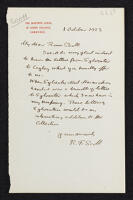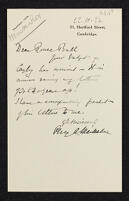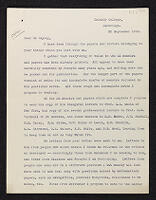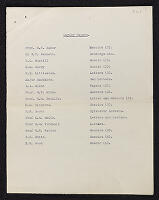The Master's Lodge, St. John's College, Cambridge. - Will be very glad to have the letters from Sylvester to Cayley. When Sylvester died MacMahon handed over a bundle of letters to Sylvester which Scott now has in his keeping; these letters would be an 'interesting addition to the collection'.
31 Hertford Street, Cambridge. - The letters he wrote to Cayley have arrived; 'curious seeing my letters of 30-40 years ago!'; has a 'corresponding packet' of Cayley's letters to him.
Trinity College, Cambridge. - Has been through Cayley's father's papers gathers that 'everything of value in the MS memoirs and papers has already been printed. All appear to have been carefully examined by Forsyth many years ago, and nothing more can be picked out for publication'. The largest part of the papers 'consist of notes for and incomplete drafts of memoirs included in his published works. All these rough and incomplete notes I propose to destroy'.
Lists proposed recipients of materials. Has no letters himself from Arthur Cayley. Thinks letters from living writers should be either returned to them or destroyed; is therefore returning MacMahon's letters, and destroying those from Glaisher and Forsyth. Of letters from people now dead he proposes to send those from Sylvester to the Master of St John's [R. F. Scott]; thinks most of the rest should be destroyed, though he mentions a few people to whom he would like to send 'a certain number' which he feels would be unproblematic to send. Encloses a few letters and papers 'of a personal character' for Cayley to take care of.
The list gives the name of each recipient, and a brief note of what they were sent of Cayley's papers by Rouse Ball. The copies of letters sent to recipients are in most case form letters, explaining that on the death of Cayley's widow his papers were put into Rouse Ball's hands with a request that he should destroy or dispose of them as he saw fit; 'all involving matter which might be published was dealt with years ago, and what was preserved has no interest beyond the fact that it is a specimen of his work'. Longer letters were sent to G. T. Bennett, also asking whether he would like to see the models of Archimedean and other solids made by W. W. Taylor, and to D. E. Smith, also taking the opportunity to send a paper on Euler which might be of interest to the American Mathematical Monthly. A long second letter to E. H. Neville gives details of the nature of Cayley's papers, and the principles by which Rouse Ball decided what should be destroyed: 'As for letters to him, of which many hundreds were put in my hands, I laid down the rule that in general such letters should be destroyed or sent back to the writers if they were alive'; lists the few exceptions; the letter also suggests that Neville take a look at Monge's Card-Shuffling Problem.



